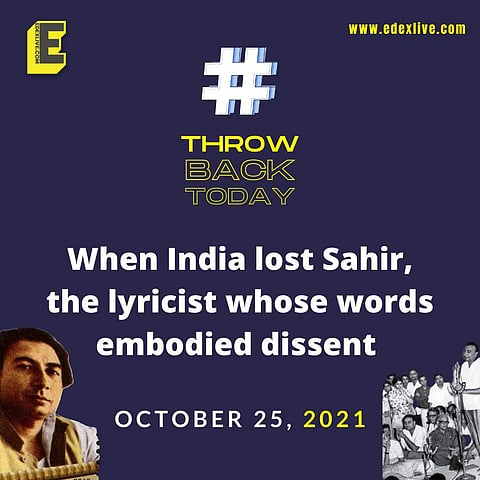

What would the world be without all those poets whose words became weapons of resistance for millions to bring about a change, a revolution, an inquilab? On October 25, 1980, the country lost one such poet, Abdul Haye — popularly known by his pen name Sahir Ludhianvi — whose writings reflected the talkhiyan (bitterness) of his times in rose-tucked pages of wrinkled-old-books, spoke truth to power at mushairais (poetic symposiums) and made socio-political statements in songs that everyday people sang on the streets.
Sahir was the people's poet. From the big screens, his words reached the placards and the drumbeats of dissenters across generations. We continue to see them being chanted at protest movements. Insaanon ki izzat jab jhoothe sikkon mein na toli jaayegi, woh subah kabhi toh aayegi (When human dignity shall not be measured in made-up coins, such a morning will someday arrive. It will someday arrive) Can you imagine lyrics like these in mainstream Hindi cinema today? Apart from being a lyricist in Bollywood, he was a part of the Progressive Writers Association. His poems and songs are just as relevant today as they were back then, which his close friend of the time, Javed Akhtar, says is quite ironic.
Speaking at an event in Delhi a couple of years ago, Akhtar says that Sahir wrote about mass deprivation that he saw all around him and the fact that his poems are still so relevant today is sad because that would mean the suffering Sahir spoke of continues to exist. The two poets remained close until the very end; even the events that unfolded during Sahir's funeral left a long-lasting impact on Akhtar.
As the story goes, having borrowed Rs 200 from the elder poet, Akhtar would often joke about never returning it. Sahir would play along and say that he would find a way to collect the debt Akhtar owed him. Just moments after Sahir was buried at the Juhu Muslim Cemetary, a person approached Akhtar and told him that he is the gravedigger. Akhtar was the only one left behind at the cemetery. The gravedigger told him that he had to be paid, when Akhtar asked how much, the gravedigger said, "Two hundred rupees."
